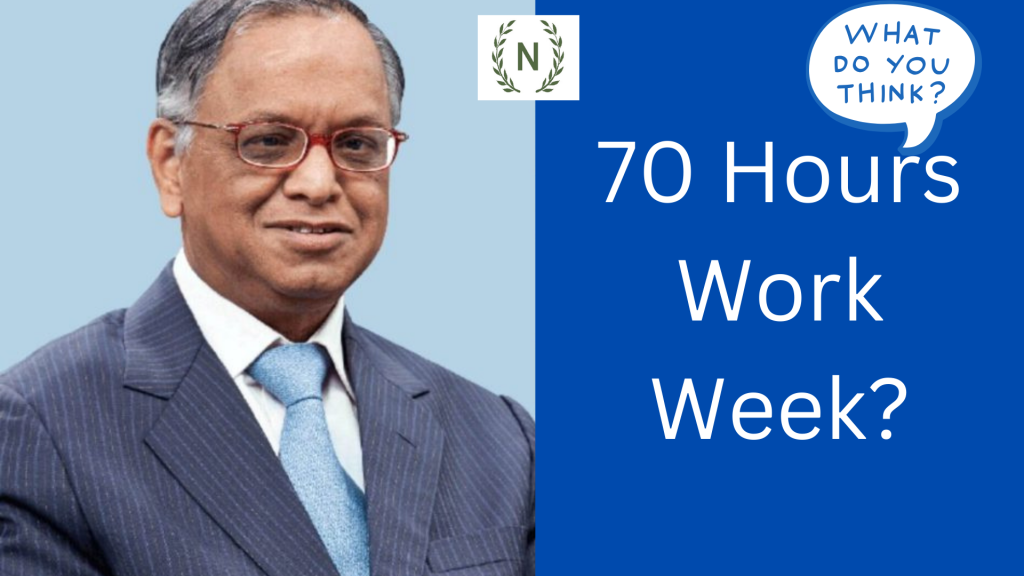
Narayana Murthy, the co-founder of Infosys and a celebrated figure in India’s corporate world, has recently reignited debates about work culture with his controversial advocacy for a 70-hour work week. His remarks, aimed at urging Indian youth to embrace longer working hours for the sake of national productivity, have sparked a polarizing conversation across industries, social media, and policy circles.
While some hail his call as a much-needed push for discipline and hard work, others criticize it as tone-deaf to modern concerns about work-life balance and mental health. This blog delves into the nuances of Narayana Murthy’s stance, exploring whether his vision is a pragmatic roadmap for India’s economic growth or an outdated expectation in an evolving work culture.
Narayana Murthy’s Perspective: Hard Work as the Key to Progress
Narayana Murthy’s argument for a 70-hour workweek stems from his belief in the transformative power of hard work. He has consistently emphasized that India’s work productivity is among the lowest globally and that achieving global competitiveness requires extraordinary effort. Drawing parallels with post-World War II Germany and Japan—nations that rebuilt themselves through disciplined labor—Murthy advocates for a similar ethos in India.
- Personal Example: Narayana Murthy cites his own rigorous schedule during his tenure at Infosys, where he worked over 14 hours daily for six-and-a-half days a week. He views this as a testament to the sacrifices required for success.
- Civic Responsibility: He also ties this philosophy to a sense of duty, arguing that those who have benefited from subsidized education owe it to society to work harder.
- Inspiration from Leadership: Narayana Murthy points to Prime Minister Narendra Modi’s reputed 100-hour work weeks as an example of dedication that citizens should emulate.
Murthy’s stance is not new; he has previously suggested extended working hours during crises like the COVID-19 pandemic to compensate for economic slowdowns. However, his latest comments have drawn heightened scrutiny due to their timing and implications.
The Debate: Productivity vs. Well-Being
Murthy’s advocacy has sparked a fierce debate between proponents who see it as a call to action and critics who view it as an unrealistic demand.
Arguments Supporting Murthy’s Vision
- Boosting National Productivity:
- Proponents argue that India’s demographic dividend—its large, young workforce—can only be leveraged if individuals are willing to put in extra effort.
- Extended hours could help bridge productivity gaps and accelerate economic growth.
- Career Advancement:
- Longer hours may provide opportunities for skill mastery and faster career progression, especially in competitive industries like technology and finance.
- Historical Precedents:
- Countries like Germany and Japan achieved remarkable post-war recoveries through disciplined labor. Advocates believe India could replicate this success by fostering a similar culture.
- Entrepreneurial Spirit:
- For entrepreneurs and startups, long hours are often seen as essential to managing multiple roles and driving innovation during the early stages.

Criticism of the 70-Hour WorkWeek
- Burnout and Mental Health Risks:
- Experts warn that prolonged working hours can lead to chronic stress, burnout, and mental health issues such as anxiety and depression.
- Studies show diminishing returns on productivity beyond 50-55 hours per week.
- Work-Life Imbalance:
- Critics argue that excessive focus on work undermines personal well-being, family time, and social connections.
- The demand for extended hours disproportionately affects women juggling professional and domestic responsibilities.
- Health Implications:
- Long working hours are linked to physical health issues such as cardiovascular diseases, obesity, and weakened immune systems due to lack of rest and exercise.
- Global Trends in Work Culture:
- While Murthy advocates longer hours, many developed nations are experimenting with reduced working weeks (e.g., Belgium’s four-day work week) to enhance productivity without compromising employee well-being.
- Economic Realities:
- Critics highlight that many Indian workers already clock long hours without commensurate pay or benefits. Asking them to extend their schedules further could exacerbate existing inequalities.
A Closer Look at Productivity
Narayana Murthy’s emphasis on productivity raises important questions: Is increasing working hours truly the best way to achieve higher output? Research suggests otherwise:
- Productivity per hour tends to decline after a certain threshold of working hours due to fatigue and reduced focus.
- Nations like Germany and Japan have achieved high productivity with shorter annual working hours compared to India.
- Modern workplaces increasingly prioritize efficiency over sheer time spent at work, emphasizing innovation, collaboration, and skill development instead.
Balancing Ambition with Well-Being
The debate surrounding Narayana Murthy’s comments underscores the need for balance between ambition and well-being in modern work culture. While dedication and hard work are undeniably important, they must be tempered with considerations of sustainability and employee health.
Potential Middle Ground
- Flexible Work Models:
- Encouraging flexibility in work schedules can allow employees to manage their time effectively without compromising productivity.
- Skill Development:
- Investing in upskilling programs can enhance productivity without requiring longer hours.
- Focus on Quality Over Quantity:
- Shifting performance metrics from hours worked to outcomes achieved can foster a healthier work environment.
- Supportive Policies:
- Organizations can implement policies promoting mental health, regular breaks, and fair compensation to mitigate the risks of burnout.
Conclusion: A Vision Worth Revisiting?
Narayana Murthy’s call for a 70-hour workweek is undoubtedly rooted in his deep commitment to India’s progress. His personal example serves as an inspiration for many aspiring professionals. However, his vision also raises valid concerns about its feasibility in today’s context of evolving workplace norms. Rather than advocating blanket policies for extended working hours, perhaps the focus should shift toward creating environments where employees can thrive both professionally and personally.
if you want personality development then you can read our other blog
A balanced approach—combining hard work with well-being—may ultimately prove more effective in driving sustainable growth for individuals and the nation alike.The debate initiated by Narayana Murthy is an opportunity for India to reimagine its relationship with work: Can we achieve excellence without sacrificing quality of life? The answer lies not just in how long we work but in how well we use our time.
